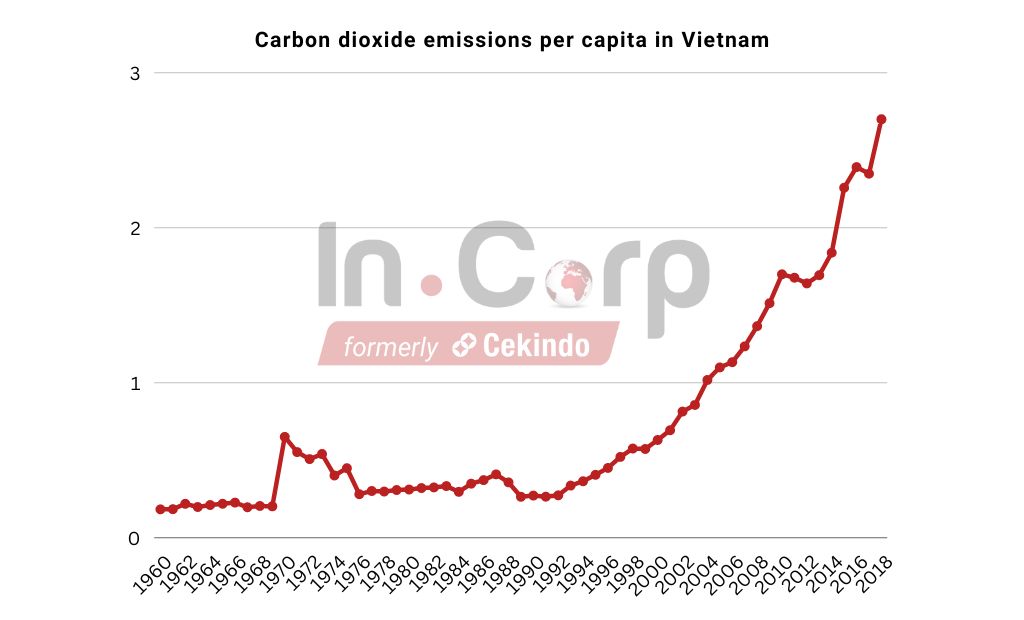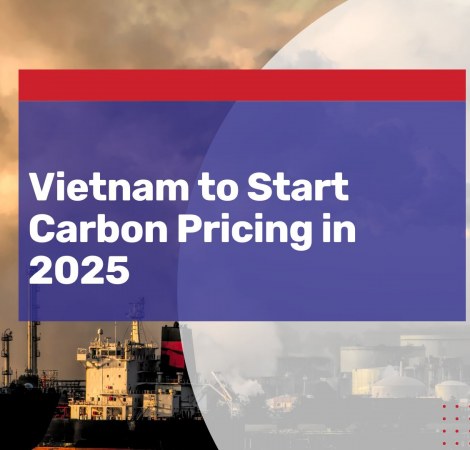To address climate change threats, Vietnam and many other countries have committed to reducing toxic fumes by attempting to reduce and neutralize carbon footprints by 2050. This is directly reflected in the countries’ aggressive investment in alternative energy sources, especially wind and solar.
Start your Company in Vietnam: Check out Cekindo’s Company Registration
Vietnam will embark on a roadmap to reduce coal-fired power generation and aims to double the installed wind and solar power generation capacity to 31-38 gigawatts by 2030. There are several other measures Vietnam’s government has taken to consolidate its goals of carbon neutrality, like carbon pricing and ETS.
However, the country has reached out to developed nations requesting that it needs funds, technology, and expertise from global investors to achieve the ambitious clean energy targets, according to Reuters. In this article, we will see in detail what carbon pricing is and how it can help reduce carbon emissions.
Carbon Pricing Brings Vietnam Closer to Decarbonization
Vietnam’s rapid economic growth and increased energy consumption have caused an exponential increase in GHG (Greenhouse Gases) emissions, placing the country second on Southeast Asia’s most polluted countries in 2019.

In order to meet the country’s economic development and environmental conservation goals, Vietnam’s revised Law on Environmental Protection came with the new domestic carbon emission trading scheme, detailed in Decree 06/2022/ND-CP. This scheme intends to build a carbon pricing structure that would penalize GHG emitters on the basis of “polluter pays.”
Moreover, the carbon emission trading scheme (ETS) aimed to create a market mechanism that companies, cities, and countries can use to cut their GHG emissions through buying credits to offset their actual emissions.
The carbon pricing mechanism would be supported by complementary policies and technologies, like the national GHG inventory system, the monitoring – reporting – verification (MRV) system, as well as the National Registry. The Vietnam ETS will likely impact major polluters first, similar to international best practices, before making its way to regulate smaller businesses.
Four important environmental and developmental issues were addressed by the new regulation.
- Decarbonization through a carbon price system would aid in the reduction of GHG emissions, air pollution, and thereby human health.
- Reducing emissions through a carbon price mechanism would assist to mitigate the effects of climate change and, as a result, lessen environmental degradation pressures.
- Carbon pricing methods have the potential to provide money for the state budget while also encouraging the development of greener and cleaner technological solutions that cut emissions.
- According to the World Bank, Carbon pricing regimes will help Vietnam attract more foreign direct investment and improve its export competitiveness.
The Decree will be piloted in 2025 and will likely take effect starting 2028. The government will continue to roll out updates on carbon credit management, GHG quota and carbon credit exchange rates and carbon credits, and procedures for the exchange.
Related: Preserving Environmental Sustainability through Energy-efficient Lighting
Why Is Carbon Pricing Important For Vietnam?
Carbon pricing in the form of an emissions trading system (ETS) for greenhouse gasses was legalized under a new Law on Environmental Protection that took effect on January 1, 2022.
Low carbon pricing on fossil fuel sources of USD 1.85 and USD 3.86 per ton, starting in 2022 and growing at a real rate of 10% each year, might cut emissions from fossil fuel burning by around 5.5% and 11.2%, respectively, by 2030, compared to business as usual. This is according to a paper by Australia National University.
A carbon tax would be ideal, and it could be implemented by simply modifying existing charges on coal and oil goods and imposing a new fee on natural gas. In terms of perceived political viability, an ETS, on the other hand, performs admirably.
For carbon prices to operate effectively, capabilities in monitoring and enforcement must be strengthened. Effective communication and promotional campaigns from the government would also help the public and investors understand the benefits of carbon pricing.
Carbon pricing will provide funds that might be utilized to increase Vietnam’s global competitiveness if spent on infrastructure and other projects, in addition to its environmental advantages.
Carbon pricing might also assist Vietnam to make the case for being excluded from any carbon border adjustments imposed by other nations, allowing it to take full advantage of trade programs like the EU-Vietnam Free Trade Agreement (EVFTA), according to Policy Forum.
The carbon price strategy would also encourage the use of more solar and wind energy. This is critical, given the scarcity of finance for coal-fired power plants and the necessity to transition away from coal-fired electricity.
RELATED: A Comprehensive Guide to Green Energy Growth & Investment Opportunities in Vietnam
This article was originally published in December 2021 and was updated with more in-depth and accurate information in October 2022.
Originally published: 29 December 2021; last updated: 3 October 2022
How Can Cekindo Help?
Investing or expanding your business in Vietnam can be a time-consuming process, especially ensuring carbon emission compliance with the changing regulations. However, investing in alternative energy in Vietnam is a lucrative new industry. Cekindo’s comprehensive business solution services will not only assist you with registering your company but will also ensure that you stay on top of all legal compliances. Following incorporation, we also provide HR and accounting services, business license acquisition, and a seamless carbon tax-paying experience.
